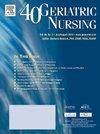Healthcare's empathy in elderly care: How anxiety, depression, and professional quality of life influence empathic abilities
IF 2.5
3区 医学
Q3 GERIATRICS & GERONTOLOGY
引用次数: 0
Abstract
The objective of this descriptive cross-sectional study was to determine the relationship between empathy, anxiety, depression, compassion satisfaction, and fatigue in healthcare professionals working in elderly care centers. A sample of 104 healthcare professionals from nursing homes in Spain completed questionnaires assessing empathic skills, anxiety, depression, and quality of life. The results showed high levels of empathy and compassion satisfaction among participants and significant relationships between empathic skills, anxiety, depression, and quality of life measures. The regression analysis identified interpersonal reactivity, depression, compassion satisfaction, fatigue, and years of experience as significant predictors of empathy in the clinical context. Empathy is of paramount importance in the field of geriatric care, with enhanced empathic abilities exerting a beneficial influence on professional practice. However, the presence of depressive symptoms may hinder empathic abilities and affect the quality of care. Compassion satisfaction emerged as a significant predictor of empathy, highlighting the importance of emotional support and communication skills training in healthcare settings.
医疗保健在老年护理中的共情:焦虑、抑郁和职业生活质量如何影响共情能力
摘要本研究旨在探讨在老年护理中心工作的医护人员的共情、焦虑、抑郁、同情满意度和疲劳之间的关系。来自西班牙养老院的104名医疗保健专业人员完成了评估共情技能、焦虑、抑郁和生活质量的问卷调查。结果显示,参与者的共情和同情满意度水平较高,共情技能、焦虑、抑郁和生活质量指标之间存在显著关系。回归分析发现人际反应、抑郁、同情满意度、疲劳和经验年数是临床共情的重要预测因子。在老年护理领域,共情是至关重要的,增强共情能力对专业实践产生有益的影响。然而,抑郁症状的存在可能会阻碍移情能力并影响护理质量。同情满意度是同理心的重要预测指标,强调了医疗环境中情感支持和沟通技巧培训的重要性。
本文章由计算机程序翻译,如有差异,请以英文原文为准。
求助全文
约1分钟内获得全文
求助全文
来源期刊

Geriatric Nursing
医学-护理
CiteScore
3.80
自引率
7.40%
发文量
257
审稿时长
>12 weeks
期刊介绍:
Geriatric Nursing is a comprehensive source for clinical information and management advice relating to the care of older adults. The journal''s peer-reviewed articles report the latest developments in the management of acute and chronic disorders and provide practical advice on care of older adults across the long term continuum. Geriatric Nursing addresses current issues related to drugs, advance directives, staff development and management, legal issues, client and caregiver education, infection control, and other topics. The journal is written specifically for nurses and nurse practitioners who work with older adults in any care setting.
 求助内容:
求助内容: 应助结果提醒方式:
应助结果提醒方式:


